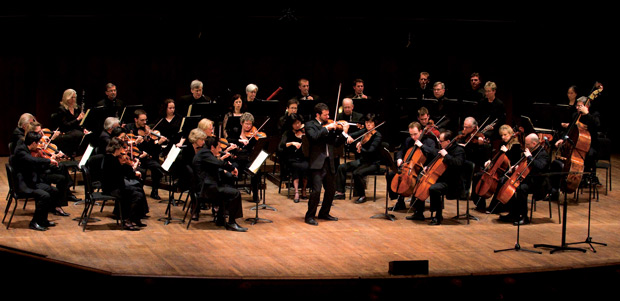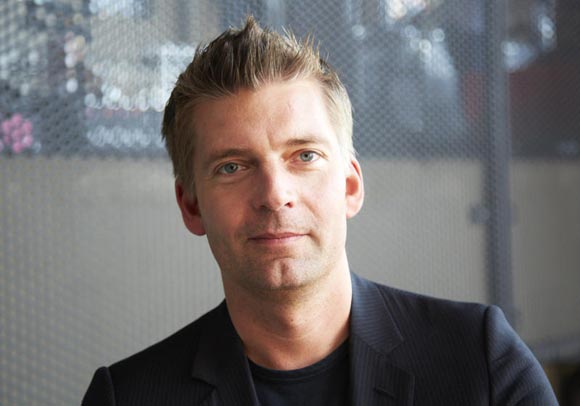
After a long absence, Saint Paul Chamber Orchestra returns home to the Ordway
Saint Paul Chamber Orchestra (a Knight Arts grantee) returned home to the Ordway the weekend of May 24, 25 and 26, after several post-lockout concerts in neighborhood venues around the Metro area. The show featured a world premiere commission by German composer and conductor Matthias Pintscher (who also led the orchestra), preceded by an artfully chosen collection of brief, melodic works by Mendelssohn, Fauré, Debussy and Poulenc. Diverse as these works are in mood and structure, there’s a strong narrative thread running throughout, and an awareness of the tension and interplay between historical musical forms and the inevitable urge toward the new, toward experiment and innovation.
Friday evening’s performance was well attended by an enthusiastically supportive, if not quite packed house. And the orchestra played beautifully, as responsive to one another and the music, as subtly expressive and technically impressive as ever. The performance was a welcome but bittersweet homecoming, given the impending loss of several key musicians (to retirement and resignation, as well as by contractually agreed upon ensemble contraction). And there’s a lingering disquiet left by the months of acrimonious contract disputes from this nearly-lost season that will, frankly, be hard to shake.
The offerings from Debussy and Fauré both work from traditional dance melodies. Fauré’s is a melancholy, Spanish inflected “Pavane” which swells from lilting invitation to something more plaintive, more agitated in tempo and insistent in its wooing – like a lover on the outs trying desperately to seduce her partner into one last turn. Debussy’s “Sarabande” is more measured, more dignified in its expression, but equally nostalgic – all sweeping gestures and grand phrases, with strings at the fore. The Mendelssohn works are prominent in the evening’s line-up: an overture inspired by the medieval mermaid legend of Melusina and a memorable rendition of his nocturne and scherzo composed for Shakespeare’s “A Midsummer Night’s Dream.” Poulenc’s “Deux Marches et un Intermede for Chamber Orchestra” are a highlight of the evening. Originally framed as a short orchestral suite for a dinner at the 1937 Paris World’s Fair, the music is mercurial – moving from a triumphal opening march into a contemplative, richly textured intermezzo which, in turn, shades into the darker, more angular tones of the second march – a pivot in mood the program notes’ writer, Aaron Grad, chalks up to “a reflection of the war clouds hanging over Europe at that time.”
After intermission, the night’s headline piece offers a shift in tone: a cerebral, atmospheric piece “for large ensemble” by German composer and conductor Matthias Pintscher, “Bereshit (In a Beginning).”
“Bereshit,” Pintscher tells us before the performers begin, “means not ‘the beginning’ but ‘a beginning’ in Hebrew.” It’s the first and fundamental word of the Torah, the fecund emptiness from which the multitudes of Genesis spring. “Many composers have created work inspired by this text,” he says. “And it’s also captured my imagination. This is my version of Creation.”
Matthias Pintscher. Photo by Emanuel Ammon, courtesy of the artist’s website
Pintscher’s a charismatic conductor: he’s effortlessly in command of the score, assured in his direction and at the same time playful in his communications with the musicians, concise and eloquent in his gestures. It’s mesmerizing to watch the warmth and responsiveness of the byplay between Pintscher and the players as they move through the evening’s pieces.
His new composition is immersive and decidedly contemporary. It opens with an ambient, gravid silence from which is born shimmers of percussion and the sounding of a single tone, a natural F which recurs through the half-hour work in the voice of various instruments. Pintscher calls that F the “horizon line” around which the piece coheres. A soundscape gradually builds, adding rhythms and increasingly frenetic instrumentals – distinct queries, agitated declarations and almost-melodies – that emerge from and give way to the burgeoning river of sound. Principal second violinist Kyu-Young Kim, in particular, riffs above the sonorous fray brilliantly, with precise, peripatetic runs. Sadly, he’s also among those departing in the wake of this year’s tumult; Kim is leaving the SPCO to play with the New York Philharmonic at the season’s end.
Only a few shows remain in the 2013-2014 season: the final performances by longtime SPCO artistic partner Dawn Upshaw, the last Liquid Music installment for this year; and just one weekend’s performances, a set of Beethoven and Berlioz led by Edo de Waart, are scheduled at the Ordway. Find the full calendar of upcoming SPCO performances here: www.thespco.org.
Recent Content
-
Artsarticle ·
-
Artsarticle ·
-
Artsarticle ·


